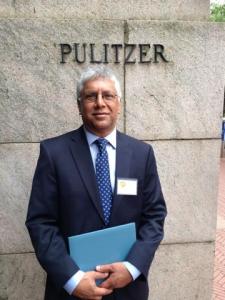Pulitzer Poet Immortalizes Atlantic Avenue, Talks Brooklyn Development
By Tobias Salinger July 24, 2014 12:22 pm
reprints

Carroll Gardens scribe Vijay Seshadri, the 2014 winner of the Pulitzer Prize in poetry, took home the honor this spring after devoting a 16-page poem to thoughts evoked by his taxi rides along Brooklyn’s Atlantic Avenue to John F. Kennedy Airport, and the chair of the writing program at Sarah Lawrence College recently took time to explain his mixed views of the street and its continuing development in an exclusive email interview with Commercial Observer.
The 60-year-old married father of one’s “3 Sections,” published by Graywolf Press, features a poem called “Personal Essay” that portrays the busy corridor which runs from the Brooklyn waterfront, past the new Barclays Center and into Queens before terminating at the Van Wyck Expressway as a Walt Whitman-inspired launching pad for existential questions and, in the poet’s words, a “redemptive movement.”
“Along the wound that is Atlantic Avenue from Flatbush to the sea—hacked out by a blunt axe, disfiguring the earth—they pack them in by the tens of thousands and surround them with discount tire outlets and disreputable used-car dealers,” reads part of the poem. “Broken, unfathomable streets spreading out into Bed-Stuy and Crown Heights…gloom under the elevated tracks of the Long Island Railroad, with which tracks a malevolent municipal authority has chosen to stitch this thoroughfare for miles and miles.”
In CO’s interview, edited and reproduced in full below, the poet who was born in India but grew up in Columbus, Ohio, dished on the meaning behind his award-winning work and his thoughts on changes to the borough where he’s a longtime resident.
CO: What parts of Atlantic Avenue does the poem describe and does the poem stem from any particular experiences (or cab rides) on the street?
Mr. Seshadri: The poem describes that part of Atlantic that runs under the elevated tracks of the LIRR, right around Bedford and through those streets that are named after other New York State cities–Albany, Utica, Troy, etc. A neighbor of mine who grew up on the Crown Heights side of Atlantic said I’d been unfair to that neighborhood, so I apologize to anyone who feels attached to it. Write it off to poetic license. Actually I find the avenue past the elevated tracks even more forbidding, and appropriated some of the images from farther down the Avenue.

How does the cab ride to JFK on Atlantic Avenue and the other description of “things” in Brooklyn (neighbors, locked bodegas, old man waiting for dialysis appointment) function in the overall theme?
That part of the poem that takes place on Atlantic is symbolically important because it is there that the speaker of the poem–who is redeemed, I should add, at the end–is experiencing greater and greater alienation from the people, the social world, the physical space he inhabits. There is for me something very strange and forlorn about going to an airport and getting on a plane, and that ride to JFK is particularly so for me.
Is the thought near the end that “just a small, manageable interval of leisurely, meditative travel in an automobile will bring you to a cliff side overlooking the eastern ocean” a summary of the poem?
It’s what introduces the meaning of the redemptive movement, the upward movement, in the poem, in the same way that Atlantic Avenue introduces the downward movement.
Who is the “they” that makes people live on Atlantic Avenue, the they that “pack[s] them in by the tens of thousands”? Is it the social order alluded to, or is it real estate developers, the government etc.? Or does it not matter because “the world is ugly and the people are sad” is an oversimplified abstraction?
People have interpreted that passage as political, but I’m not pointing fingers. I’m just taking in the general injustice of human and social experience. Surely all of us, whether we’re real-estate developers or social workers, have moments when we contemplate the lives of the poor as opposed to the lives of the well-off or the rich, and wonder why it should be so. That psychological situation is what’s important at that point in the poem, because it is a part of the drama the poem is enacting in the mind of the person speaking the poem. He has those melancholy thoughts, and such thoughts are essential to the development of his mind in the poem. I don’t write editorials; I write poems.
As a 28-year resident of the borough, what’s your view of the current and continuing development of Brooklyn (i.e. especially on Atlantic Avenue with Barclays Center and Atlantic Yards)?
I mourn the disappearance of the culture that was here when I first came to Brooklyn in the mid-eighties, but paradoxically I’m not sentimental about it. New York is always tearing itself down and building itself up again. I was opposed to the development of Atlantic Yards–I even wrote an essay for the volume Brooklyn Was Mine, which was put together as a protest to Atlantic Yards and the Barclays Center. But now that it has happened, I can see that it has a positive side to it, and the negative consequences we were fearing don’t seem to have materialized.
There was something lost, especially for people living near the Yards; and of course working people, middle-class people, are finding it very hard to live in the areas of Brooklyn that were once a refuge for them. That is a big problem for the city. Where are the people going to live who will make the city work, function? Who is going to take care of this island of global capital? Where are the people who cook the food, run the buildings, teach the children, man the hospitals, going to live?



